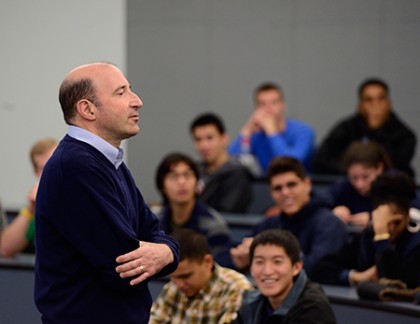On the acclaimed HBO drama The Wire, Baltimore's fictional mayor, Tommy Carcetti, wrestles with the challenges of crime and urban decay.

Image caption: Peter Beilenson, who served as Baltimore City health commissioner from 1992 through 2005, has been teaching Baltimore and 'The Wire' at Johns Hopkins for five years.
Image credit: Will Kirk / Johns Hopkins University
On Monday, Baltimore's current mayor, Stephanie Rawlings-Blake, spoke to students in a Johns Hopkins University class that uses the popular television series as a way to examine the critical issues facing Baltimore and other urban areas. Rawlings-Blake noted how far Baltimore has come since The Wire concluded its five-season run in 2008, including progress made on reducing crime and increasing the city's population.
"The city was a lot different than the Baltimore that you see now, and it's certainly way different than the Baltimore I grew up in," Rawlings-Blake said during the lecture, according to a Baltimore Business Journal article. "The violence was so pervasive—we knew people that went to parties and didn't come home."
The course, Baltimore and The Wire, was created and is taught by former Baltimore City health commissioner Peter Beilenson and is part of the undergraduate program in Public Health Studies. Past guest speakers include David Simon, creator and writer of The Wire; Michael K. Williams, the actor who portrayed Omar on the series; former Baltimore Mayor Kurt Schmoke; Ed Norris, a former Baltimore City police commissioner who also appeared in 22 episodes of The Wire; and Nancy Grasmick, former superintendent of Maryland schools.
A 2010 article published in the Gazette gives an overview of the course, including comments made by Beilenson on the first day of class during the fall 2010 semester:
"The world depicted in The Wire may seem like fiction to most of you, but in truth it is a frighteningly accurate portrait of life in some parts of Baltimore—the city in which you are sitting right now—and in many other cities throughout the United States. We're talking about poverty; the war on drugs and the illegal drug trade; city governments and their bureaucracies and how those work, or don't; politics; the police, the courts and criminal justice; homelessness; and education. This series tackles them all in a very thoughtful, interesting and realistic way."
Thx @plbeilenson for inviting me to spk to your #Baltimore & The Wire class—passionate, sharp students! @JohnsHopkins pic.twitter.com/W566VlqJXN
— Mayor Rawlings-Blake (@MayorSRB) November 17, 2014Posted in Politics+Society
Tagged urban renewal, baltimore








